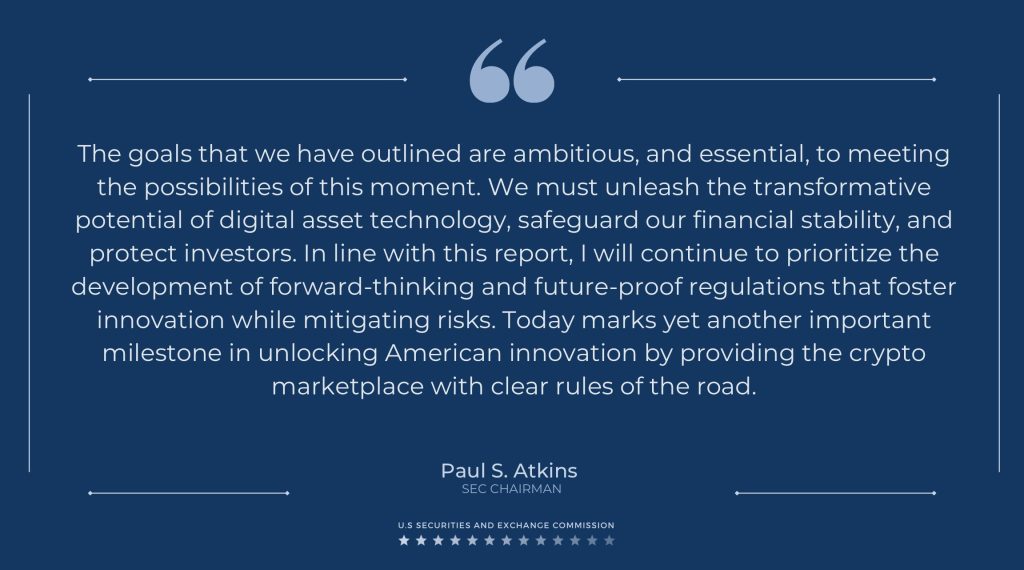SEC Launches ‘Project Crypto’ Initiative to Make America the ‘Crypto Capital of the World’
Securities and Exchange Commission (SEC) Chairman Paul Atkins announced the launch of “Project Crypto” on July 31, a comprehensive initiative designed to modernize securities regulations and allow America’s financial markets to move on-chain.
The announcement came during a speech at the America First Policy Institute, where Atkins outlined plans to bring crypto asset distributions back to America and establish regulatory frameworks for digital asset trading.
The initiative follows the release of a 166-page White House report titled “Strengthening American Leadership in Digital Financial Technology,” which categorizes cryptocurrency as “next-generation technology” alongside railroads and the internet.
The document condemns the Biden administration’s regulatory approach as creating a “hostile environment” for crypto businesses and calls for reversing policies that drove fintech firms offshore.
Framework Targets Onshoring Crypto Businesses Through Clear Guidelines
Project Crypto seeks to establish clear rules for crypto asset distributions, custody, and trading through public notice and comment procedures.
Atkins directed Commission staff to draft regulations addressing the confusion surrounding the Howey test, which has led entrepreneurs to treat all crypto assets as securities prophylactically.
The SEC plans to develop guidelines helping market participants categorize crypto assets as digital collectibles, digital commodities, or stablecoins based on economic realities.
Atkins also emphasized that being deemed a security should not carry stigma, noting that many issuers prefer the flexibility securities laws afford for product design and investor protections.
The initiative includes purpose-fit disclosures, exemptions, and safe harbors for initial coin offerings, airdrops, and network rewards. Atkins stated that the goal is to ensure issuers include Americans in distributions rather than excluding them to avoid legal complexity.
 Source: Paul Atkins on X
Source: Paul Atkins on X
The SEC will also address tokenized securities requests from Wall Street firms and Silicon Valley unicorns seeking to distribute tokenized stocks, bonds, and partnership interests within the United States.
Atkins reported that firms are “lined up at our doors” requesting tokenization capabilities previously available only offshore.
Super-App Vision Facilitates Integrated Trading Platforms
The SEC plans to allow securities intermediaries to offer comprehensive services under a single license through “super-app” functionality.
Broker-dealers with alternative trading systems could offer trading in non-security crypto assets alongside crypto asset securities, traditional securities, and services like staking and lending without requiring multiple federal or state licenses.
Atkins directed staff to develop frameworks allowing non-security crypto assets and crypto asset securities to trade side-by-side on SEC-regulated platforms. The Commission will evaluate its authority to permit non-security crypto assets subject to investment contracts to trade on unregistered venues.
The approach allows state-licensed crypto platforms not registered with the SEC to list certain crypto assets while allowing CFTC-regulated platforms to offer products with margin capabilities. As a result, the approach eliminates the need for additional Congressional authority while unlocking greater asset liquidity.
Project Crypto also addresses outdated custody requirements that limited custodial service provider options.
The SEC plans to modernize custody rules for registered intermediaries, moving away from the previous administration’s “special-purpose broker-dealer” framework and SAB 121 guidance.
Innovation Exemption Speeds Market Entry for New Business Models
The SEC is considering an innovation exemption that would allow registrants and non-registrants to quickly enter markets with new business models that don’t fit existing regulations, for which a similar standard was released for ETFs earlier today.
Innovators could comply with principles-based conditions, achieving core securities law policy goals rather than burdensome prescriptive requirements.
Proposed conditions include periodic Commission reporting, whitelisting functionality, and restrictions on tokenized securities not adhering to compliant token standards like ERC3643.
Atkins also emphasized commercial viability as the “true north” for evaluating various models.
Additionally, the initiative coincides with growing corporate adoption. A Deloitte survey found 23% of North American CFOs expect their treasury departments to use cryptocurrency within two years, rising to nearly 40% among firms with $10 billion or more in revenue.
Forty-three percent cited price volatility as their top concern, followed by accounting complexity and regulatory uncertainty.
The White House report also confirms plans for a strategic Bitcoin reserve administered by the Treasury, though it admits the reserve is not yet operational.
The document calls for Congress to affirm people’s rights to self-custody digital assets and engage in peer-to-peer transactions without financial intermediaries.
Despite these positive regulatory announcements, Bitcoin is still trading relatively flat, slightly above $118,000, with Ethereum gaining modestly above $3,760.
You May Also Like

Coinbase shares fell 12%, their biggest intraday drop since April.

FCA Lifts 4-Year Retail Ban on Crypto ETNs – Access Returns Oct. 8
